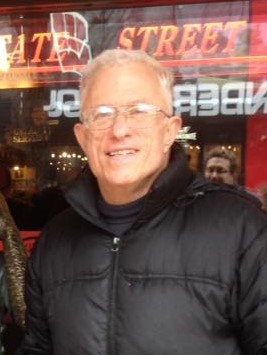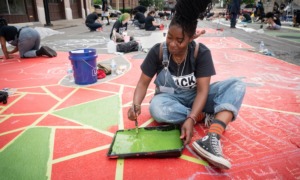
Lightspring/Shutterstock
.
Just days ago, I received a group email from fellow ACYCP (Association for Youth and Child Care Practice) Board delegate, Janet Wakefield, who is also CEO of The Journey restaurant, in Indianapolis:
“I think we have to focus on the state of our country and help and guidance for the field to play a role in uniting our country again. Time to stand up and not be a silent bystander. Sad for us all and worried for our black friends. Janet”
I set out just to write a message of support and acknowledgement in a reply all, but as I typed, the words just came flooding out:

Michael Mitchell
Yes, thank you so much Janet, for these universal words, which speak for so many of us.
I participated in the demonstration here in Madison. I am sickened and outraged that this nation doesn’t seem to want to wake up from our collective nightmare of racial violence, especially by those who are supposed to serve and protect. I say this with extra pain as my niece is a police officer who serves with bravery and compassion.
As a gay white man of the boomer generation, I grew into an adult in fear of the police for many of the same reasons people of color fear them today. The Stonewall riots in New York City in 1969, almost to the day 51 years ago, came about for many of the same reasons as those in Minneapolis today.
But I also looked to them for protection from fellow citizens, as when I was assaulted by some teens in Grand Rapids, Mich., in the mid-’80s. The police never showed up to the gay bar in which I took refuge. Again, a place many black and brown people find themselves in. It outrages me that every person of color I have ever met or worked with could potentially be a George Floyd!
Here in Madison, they refer to our police as “social workers in blue,” which seems to discourage the Rambo types from applying. Yes, we’ve had our problems, but I feel they are sincerely working on them every day. So this offers hope that if it can be done in one place, it can be done just about everywhere.
But law enforcement must change its internal culture and we, as citizens, must bring pressure on our government at all levels to make sure this happens. An individual psychological profiling, every three to four years, might be one step in the right direction. This is needed because law enforcement is a very difficult profession, which, like child and youth care (CYC) work, requires a strong mind, a resolute spirit and contemporary skills, which support best practices. Like CYC work, law enforcement can have a high stress and burnout rate.
There’s a lesson here for CYC professionals.
Have we ever asked ourselves, “Is it time to walk away?” but stayed on, letting the stress make us sick, while feeling more and more ineffective, hoping for “something” to change? Police and CYC professionals often see the worst side of humanity.
Even the most hopeful, dedicated and self-disciplined neophyte can become tomorrow’s disillusioned, defensive and angry veteran. It’s not hard, if left unaddressed, for a social service professional to go from feeling like community defender to unacknowledged social sanitary engineer.
How often have we heard, as I did from a seasoned social worker, “Well, what can you expect, they were broken when we got them.” With caseloads nearing unserviceable levels in major cities, expensive educational requirements and wages that make the term “compensation” a dark joke, CYC workers can relate. But I ask: Is benign neglect in our duties any worse than overt violence?
Funders, agency CEOs and program supervisors, take heed.
This is why today, as with almost every day, I’m rededicating myself to the vision and mission of the ACYCP. I hope everyone who reads this will do the same, and encourage others to do likewise. It may offer the only hope we have for a better tomorrow.
Michael Mitchell, the former program coordinator of the Youth Job Center program of Briarpatch Youth Services in Madison, Wis., is first vice-president and online publications editor for the Association for Youth and Child Care Practice. He has 20 years of experience teaching and counseling youth and adult clients in career development and employment skills mastery.































